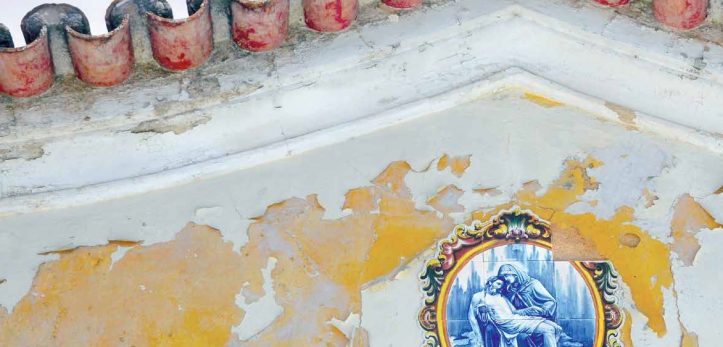Portugal – Freemasonry – Fatima. On the 100th anniversary of the apparitions of Our Lady of Fatima (part I)
Author: Grzegorz Kucharczyk,
"Love One Another!" 40/2017
History

It would seem that the apparitions of Our Lady of Fatima took place at the least favorable time. Meanwhile, owing to the political context, they showed ever more clearly that God acts through historical events and that the ultimate victory is his.

Beginnings of an anticlerical Republic
In 1910, a Republican takeover put an end to monarchy in Portugal. Power was grabbed by Republican factions, deeply infiltrated by freemasonry who were long known for their anti-Catholic phobias and prejudices. Already during the takeover, which forced King Manuel II (Oct. 5, 1910) into exile, anti-monarchy demonstrations were accompanied by assaults (often instigated by Masonic lodges) on members of the clergy and churchgoers. These acts of aggression left two Lazarist priests dead, and by the end of that year at least 15 priests and religious men were murdered. Furthermore, bands of populares (made up of Republican street rabble) had badly beaten up over one hundred members of the clergy at the same time.
A daily occurrence not only in the capital but also in the country, raids on churches and monastic houses left in their wake 20 vandalized temples in just four days of the Republic. In the Jesuit College in Campolide, near Lisbon, enemies of the Republic included laboratory equipment that was duly and completely smashed. Among other targets of attacks and havoc were editorial offices of Catholic periodicals in Lisbon (Portugal) and Porto (Palavra).
Anti-Catholic pogroms were a feature of the Portuguese Republic’s political system. Professor Tomasz Wituch, a Polish authority on Portuguese history in the 20th century, writes: “Attacks on the Church were not random occurrences. Anti-Church and anti-Catholic policies, initiated by the first Republican government, were invariably at the forefront of the Republican movement until 1918.”
Anti-Church and antiCatholic policies, initiated by the first Republican government, were invariably at the forefront of the Republican movement until 1918
A symbolic figure of the antiCatholic policy of the Portuguese Republic, Alfonso Costa was a law professor at Coimbra University, a Masonic brother, and above all, the minister of justice and later prime minister. Costa – a Portuguese counterpart of Émile Combes, the chief secularist of the French Third Republic in 1902-1905 – had an ambition to eradicate Catholicism completely from Portugal within two generations (meaning: to de-Christianize the country).
How Freemasons eradicated Catholicism from Portugal
As what happened earlier in France or during the German Kulturkampf, the war on Catholicism in Portugal began with an attack on religious orders. On October 8, 1910, the government published a decree drafted by Costa providing for the dissolution of all religious orders in Portugal. This was a mere three days after the revolutionists took power, hence the matter must have been a priority. As usual, just like in France and Germany, Jesuits were the first to be persecuted. With immediate effect, all 388 members of the Society of Jesus were arrested and expelled from Portugal.
As was the case with other anti-Catholic “culture wars” waged at that time in Europe, religious instruction in Portugal was banished from schools on October 22, 1910, while members of the clergy and Church institutions were prohibited from teaching not only in state schools but also in private ones.
The decree of October 18, 1910, ordering the removal of Catholic symbols from public buildings started a nationwide decrucification campaign in schools and government offices. Any references to God were purged from oaths and official statements. Catholic holidays were stripped of their status as public holidays. As the only days off, Sundays were left and called “days of rest” in the official nomenclature (from the decree of October 26, 1910).
By another decree, chaplains were removed from the army, while military personnel were forbidden to worship in uniform. Supervision over Catholic organizations or even over liturgy was given to civil commissioners appointed by the authorities. It goes without saying that these were mostly freemasons or their followers. It was they – and not parish priests – who were to decide about not only permissions to hold a religious service outside of a church (for instance, a Corpus Christi procession), but also the number and times of services within a given church. Additionally, clergymen were forbidden to wear cassocks or habits in public places.
The October revolution of Alfonso Costa did not spare his alma mater either. On October 23, 1910, Coimbra University witnessed the closing down of its six-century-old Faculty of Theology. A month later, the Faculty of Law had its Chair of Ecclesiastical Law abolished despite having taught Canon Law since the Middle Ages.
An integral part of the anti-Catholic legislation, amendments to family law introduced by the Republican government on November 3, 1910, legalized and greatly facilitated divorce. Published on Christmas Day 1910, a date which was selected purposefully, the decree made cohabitation legally equal to a lawfully contracted marriage. This, in practice legalized polygamy.
From the Republican perspective, it was only natural to break off diplomatic relations with the Holy See. On October 19, 1910, the papal nuncio had to leave Portugal, while the Portuguese ambassador to the Holy See returned earlier to Lisbon after being recalled by the Republican government.
The anti-Church policies of the Republic were crowned by a decree separating Church and State, modeled on the French 1905 law, issued on April 20, 1911. The word “separation” was only a smoke screen. Actually, it was meant to expel not so much the Church but rather Catholicism from the public sphere and radically restrict the Church’s freedom.
By virtue of this decree, all the property of the Church was taken over by the State. From then on, Church buildings were to be “leased out” by the State but not to members of the clergy or church institutions, but to “cult associations” (a measure directly borrowed from the French model). Importantly, such a “lease” could be cancelled without notice by the authorities for no good reason. However, unlike its French model, the Portuguese law prevented priests from even joining such associations, not to mention heading them.
The April 1911 decree, in an attempt to exclude priests who had received their education abroad (for instance in Rome), also provided for the restriction of priests who could work in Portugal to those who had completed their theological studies in Portugal despite the fact that this was increasingly more difficult, as illustrated by the policies of the government towards Coimbra University.
The law on the Separation of Church and State had a provision forcing members of the clergy “to correspond officially by mail only with the public authorities and not with one another.” The publication and reading out of pastoral letters of bishops (and of the pope) each time required permission from the authorities each time.
Decree drafters were also preoccupied by the question of church bells or rather their sound. It was decided that sounding bells at night would not be allowed, while the decision whether bells were to be kept or gotten rid of was left to municipal authorities.
Any criticism of the law on the Separation of Church and State and “other laws concerned with churches,” as well as censuring “public authorities or their acts or the form of government or the laws of the Republic” carried the penalty of imprisonment and loss of remuneration.
The separation decree provided for the support of clergymen with “state salaries”. In reality, these “salaries” were paid in full with money raised by the faithful. One-third of these funds were anyway taken by the State. To humiliate Portuguese Catholics even more, Alfonso Costa and his Masonic brothers included a provision in the decree that the remuneration was also to be paid to the priests who had been removed from their offices by the Church authorities for, for instance, involvement in sex scandals. Thus, money raised by the faithful was to be given also to the priests who had broken their vows of celibacy. After their death, the “salary” was to be inherited by their widows or children.
Firm position taken by the pope and bishops
Faced by an open war waged against the Church by the Republic controlled by Freemasons, Portuguese bishops wrote a pastoral letter to the faithful on December 24, 1910. Stressing their loyalty to the Republic, the bishops, however, forbade Catholics to take part in any actions aimed against the Church. The authorities forbade the publication and reading of the letter. The bishop of Porto did not obey the ban, which cost him imprisonment in Lisbon.
In response to the Decree for the Separation of Church and State, Portuguese bishops issued yet again a joint pastoral letter to the faithful on May 5, 1911. In it, they protested against this new anti-Church law. As a result, the authorities sentenced to exile the Patriarch of Lisbon, Antonio Mendes Belo, and the bishops of Braganza, Faro, Lamego, Portalegre and Viseu. The bishop of Porto had already been imprisoned earlier). In this way, Portugal’s entire episcopate was forced into exile. It was an unprecedented development in the country’s history and unheard of in the history of any other nation.
The anti-Church policies of the Republic were crowned by a decree separating Church and State, modeled on the French 1905 law, issued on April 20, 1911. The word “separation” was only a smoke screen. Actually, it was meant to expel not so much the Church but rather Catholicism from the public sphere and radically restrict the Church’s freedom
Launched by the Republic (read: Freemasonry), the persecution of the Church in Portugal drew a firm reaction from Rome. On May 24, 1911, Pope Pius X issued the encyclical Iamdudum Lusitaniae in which he denounced the “vicious and pernicious” Decree for the Separation of Church and State by calling it “a law that despises God and repudiates the Catholic faith.” The Holy Father had no doubt either as to the purpose of this and other anti-Church laws: “the reduction of the Church to servitude to the State by oppression in all that touches her sacred power and spirit.”
How fanatical the Portuguese secularists were, who put their ideology first before Portugal’s raison d’état, could be seen in the Republican government’s attempt to extend the anti-Catholic legislation to Portugal’s colonies. What this attempt disregarded was the fact that the presence of the Church in these territories (since the 15th century) was the strongest tie biding the colonies to the mother country.
In 1913, the Portuguese government sent “secular missions” to the colonies where they were to replace Catholic clergy in the missionary work. More reason in this respect was shown by colonial administration which, as in Angola and Mozambique, refused outright to pursue secularist policies.
The “secular missions” were one of the ideas of Alfonso Costa, who in January 1913 became prime minster. His rule was marked by truly militant anticlericalism. Literally. In this, too, Costa emulated his French predecessors who in the Émile Combes era (1902-1905) sent hit squads into the country to fight such “manifestations of clericalism” as First Communion celebrations or Corpus Christi processions.
Costa asked Carbonari (carbonaria – a radical branch of Freemasons) for help. Carbonari hit squads – in police files always described as “unknown perpetrators” – acted with absolute impunity to implement Prime Minister Costa’s plan to make Portugal an utterly secular state. One of such acts was throwing bombs at the procession in honor of St. Anthony that traditionally moved along the streets of Lisbon on June 10, 1913. This savage attack left over dozen faithful dead, including a few children.
Such “anticlerical adventures” were unacceptable, however, to more moderate Republicans. On January 25, 1914, Prime Minister Costa was forced to resign. A new cabinet, headed by Bernardin Machado, tempered the anti-Catholic policy of its predecessors. In February 1914, bishops were allowed to return from exile. In addition, permission was given for priests to join “cult associations” administering church buildings. The “liberalization” was marked by the fact that priests could once again wear cassocks in public.
Source: https://loamagazine.org/archive/2017/2017-40/portugal-freemasonry-fatima-on-the-100th-anniversary-of-the-apparitions-of-our-lady-of-fatima-part-i
The article was published with the permission from "Love One Another!" in May 2021.
Submit
your article!
Read
more articles - Free!
Need
translation jobs? Click here!
Translation
agencies are welcome to register here - Free!
Freelance
translators are welcome to register here - Free!
Subscribe
to TranslationDirectory.com newsletter - Free!
Take
part in TranslationDirectory.com poll - your voice counts!
|





